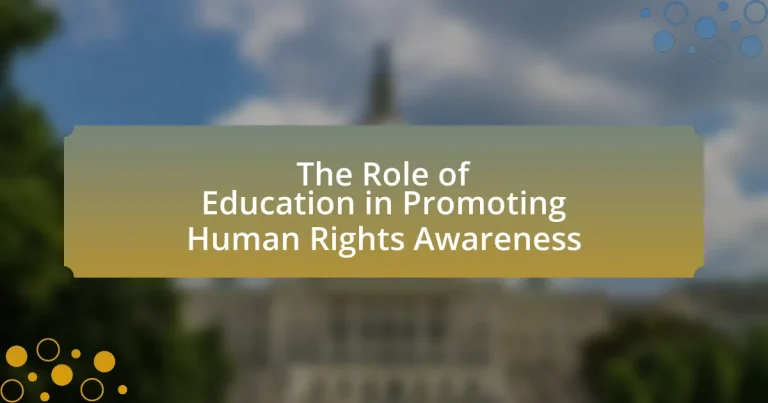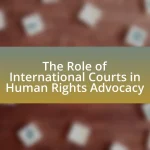Education plays a vital role in promoting human rights awareness by equipping individuals with knowledge about their rights and the rights of others. The article explores how human rights education fosters critical thinking, civic engagement, and understanding of key concepts such as equality and non-discrimination. It highlights the importance of integrating human rights topics into curricula, effective teaching methods, and the impact of community involvement on awareness. Additionally, the article addresses challenges educators face in promoting human rights education and offers strategies to enhance its effectiveness, ultimately emphasizing the significance of informed and active citizenship in advocating for social justice.
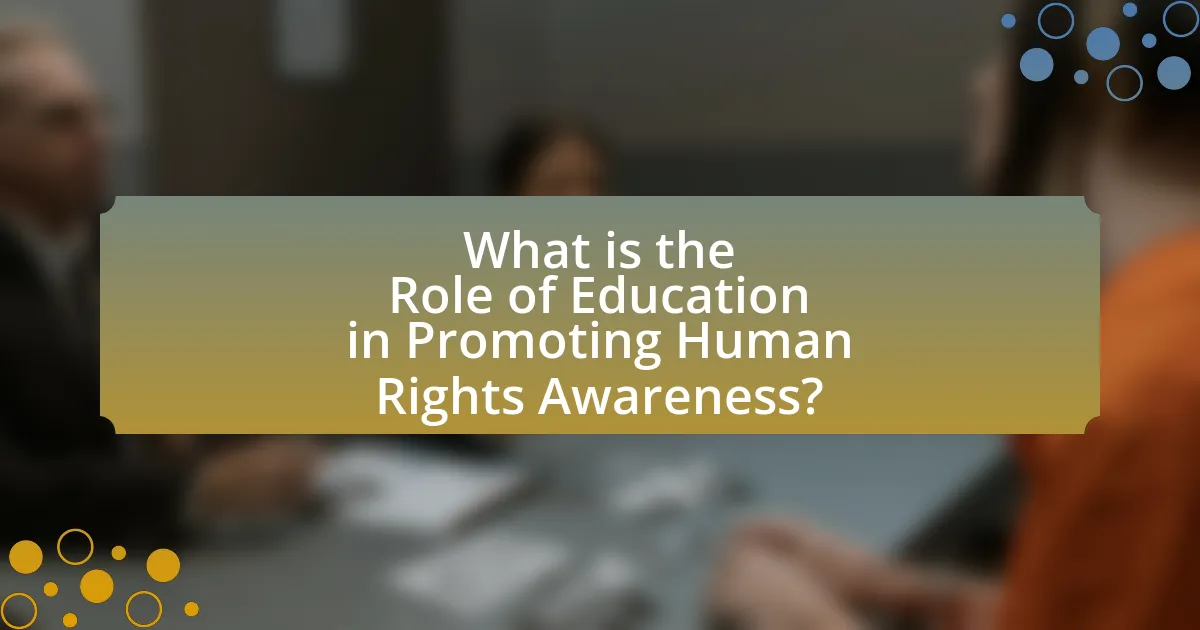
What is the Role of Education in Promoting Human Rights Awareness?
Education plays a crucial role in promoting human rights awareness by equipping individuals with knowledge about their rights and the rights of others. Through curricula that include human rights education, students learn about fundamental freedoms, social justice, and the importance of equality. Research indicates that education fosters critical thinking and encourages civic engagement, which are essential for advocating human rights. For instance, the United Nations Educational, Scientific and Cultural Organization (UNESCO) emphasizes that human rights education can lead to a more informed and active citizenry, ultimately contributing to the protection and promotion of human rights globally.
How does education contribute to understanding human rights?
Education enhances understanding of human rights by providing individuals with knowledge about their rights and the rights of others. Through curricula that include human rights history, legal frameworks, and ethical considerations, education fosters critical thinking and awareness. For instance, UNESCO emphasizes that education for human rights promotes respect for diversity and encourages active citizenship, which is essential for a democratic society. Furthermore, studies show that educated individuals are more likely to advocate for their rights and the rights of marginalized groups, as evidenced by the increased participation in human rights movements among those with higher education levels.
What are the key concepts of human rights that education addresses?
Education addresses key concepts of human rights such as equality, non-discrimination, participation, and empowerment. These concepts are fundamental to fostering an understanding of human dignity and social justice. For instance, education promotes equality by ensuring that all individuals, regardless of their background, have access to learning opportunities, which is supported by Article 26 of the Universal Declaration of Human Rights that states everyone has the right to education. Additionally, education combats discrimination by teaching respect for diversity and inclusion, aligning with the principles outlined in the Convention on the Elimination of All Forms of Discrimination Against Women. Furthermore, education encourages participation in civic life, empowering individuals to advocate for their rights and the rights of others, as emphasized in the International Covenant on Civil and Political Rights.
How does education shape perceptions of human rights?
Education shapes perceptions of human rights by providing individuals with knowledge about their rights and the rights of others, fostering critical thinking and empathy. Through curricula that include human rights education, students learn about historical injustices, legal frameworks, and the importance of civic engagement. For instance, studies show that countries with comprehensive human rights education programs, such as those implemented by the United Nations Educational, Scientific and Cultural Organization (UNESCO), report higher levels of awareness and advocacy for human rights among their populations. This educational approach not only informs individuals but also empowers them to challenge violations and promote social justice, thereby reinforcing the societal value placed on human rights.
Why is human rights awareness important in education?
Human rights awareness is important in education because it fosters a culture of respect, equality, and justice among students. By integrating human rights education into curricula, schools equip learners with the knowledge and skills necessary to recognize, advocate for, and protect their own rights and the rights of others. Research indicates that education that emphasizes human rights can lead to reduced instances of bullying and discrimination, as students become more empathetic and socially responsible. For example, a study by the United Nations Educational, Scientific and Cultural Organization (UNESCO) found that human rights education contributes to the development of critical thinking and active citizenship, which are essential for a democratic society.
What impact does human rights awareness have on society?
Human rights awareness significantly enhances societal cohesion and promotes social justice. When individuals are educated about their rights and the rights of others, they are more likely to advocate for equality and challenge injustices. For instance, studies have shown that countries with higher levels of human rights awareness tend to experience lower levels of discrimination and violence, as citizens are empowered to hold authorities accountable. Furthermore, the Universal Declaration of Human Rights, adopted by the United Nations in 1948, emphasizes the importance of education in fostering respect for human rights, indicating that informed societies are better equipped to protect and promote these rights.
How does human rights education empower individuals?
Human rights education empowers individuals by equipping them with knowledge about their rights and the rights of others, fostering critical thinking and advocacy skills. This education enables individuals to recognize violations, advocate for justice, and participate actively in their communities. Studies show that individuals who receive human rights education are more likely to engage in civic activities, such as voting and community organizing, which enhances social cohesion and democratic participation. For instance, a report by the United Nations Educational, Scientific and Cultural Organization (UNESCO) highlights that human rights education contributes to the development of a culture of respect for human rights, leading to more informed and active citizens.
What methods are effective in teaching human rights?
Effective methods for teaching human rights include experiential learning, critical pedagogy, and the use of multimedia resources. Experiential learning engages students through simulations, role-playing, and community service, allowing them to understand human rights issues in real-world contexts. Critical pedagogy encourages students to question societal norms and power structures, fostering critical thinking about human rights. Multimedia resources, such as documentaries and interactive online platforms, enhance engagement and provide diverse perspectives on human rights topics. Research indicates that these methods improve retention and understanding of human rights concepts, as evidenced by studies showing increased student awareness and advocacy following such educational approaches.
What role do curricula play in human rights education?
Curricula play a crucial role in human rights education by providing structured content that informs students about their rights and responsibilities. They serve as a framework for teaching essential concepts such as equality, justice, and respect for diversity, which are foundational to understanding human rights. For instance, the inclusion of human rights topics in educational standards, as seen in various countries’ national curricula, ensures that students are exposed to these critical issues from an early age. Research indicates that effective human rights education curricula can lead to increased awareness and advocacy among students, fostering a culture of respect and understanding in society.
How can educators engage students in human rights discussions?
Educators can engage students in human rights discussions by incorporating interactive activities such as debates, role-playing, and case studies that encourage critical thinking. These methods allow students to explore real-world scenarios and understand the implications of human rights issues. For instance, a study by the United Nations Educational, Scientific and Cultural Organization (UNESCO) highlights that participatory learning approaches significantly enhance students’ understanding of human rights concepts and their relevance in society. By facilitating discussions around current events and historical contexts, educators can foster a deeper awareness and commitment to human rights among students.
How can education systems integrate human rights awareness?
Education systems can integrate human rights awareness by incorporating human rights education into the curriculum across all subjects and grade levels. This approach ensures that students learn about their rights and the rights of others, fostering a culture of respect and understanding. For instance, the United Nations Educational, Scientific and Cultural Organization (UNESCO) emphasizes the importance of teaching human rights as a fundamental part of education, stating that it promotes critical thinking and active citizenship. Additionally, training teachers in human rights principles equips them to effectively convey these concepts to students, enhancing the overall impact of the education system on human rights awareness.
What challenges do educators face in promoting human rights awareness?
Educators face significant challenges in promoting human rights awareness, primarily due to a lack of resources and institutional support. Many educational institutions do not prioritize human rights education in their curricula, leading to insufficient training for teachers on the subject. According to a report by the United Nations Educational, Scientific and Cultural Organization (UNESCO), only 30% of countries include human rights education in their national curricula, which limits educators’ ability to effectively teach these concepts. Additionally, societal and cultural resistance can hinder discussions around sensitive topics related to human rights, making it difficult for educators to engage students meaningfully. Furthermore, educators often encounter varying levels of student interest and understanding, which complicates the delivery of human rights education.
How can these challenges be overcome?
Education can overcome challenges in promoting human rights awareness by integrating human rights education into school curricula. This approach ensures that students receive comprehensive knowledge about their rights and the rights of others, fostering a culture of respect and understanding. Research by the United Nations Educational, Scientific and Cultural Organization (UNESCO) indicates that human rights education enhances critical thinking and empowers individuals to advocate for their rights and the rights of others. By implementing training programs for educators, schools can effectively teach human rights principles, thereby addressing misconceptions and fostering a more informed society.
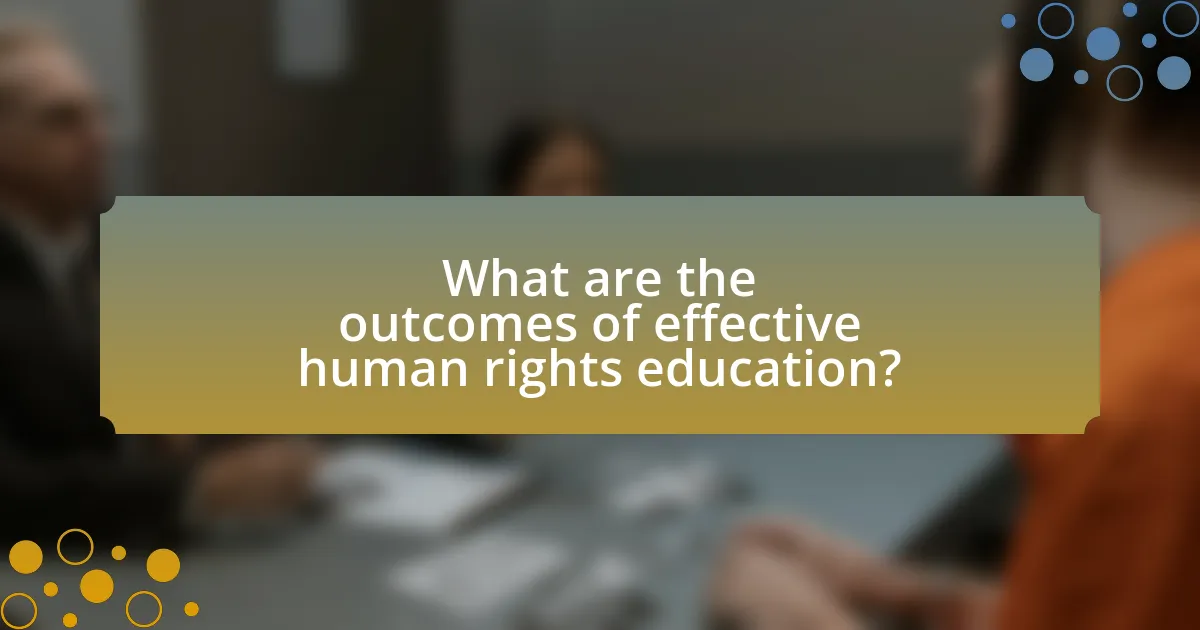
What are the outcomes of effective human rights education?
Effective human rights education leads to increased awareness, understanding, and advocacy for human rights among individuals and communities. This education empowers learners to recognize and challenge human rights violations, fostering a culture of respect and dignity. Studies show that individuals who undergo human rights education are more likely to engage in civic activities, such as voting and community organizing, which contributes to stronger democratic societies. Furthermore, effective human rights education has been linked to reduced discrimination and violence, as it promotes empathy and respect for diversity. For instance, a report by the United Nations Educational, Scientific and Cultural Organization (UNESCO) highlights that schools implementing human rights education curricula see a significant decrease in bullying and intolerance among students.
How does human rights education influence student behavior?
Human rights education significantly influences student behavior by fostering empathy, respect, and social responsibility. This educational approach equips students with knowledge about their rights and the rights of others, leading to increased awareness of social justice issues. Research indicates that students exposed to human rights education demonstrate improved interpersonal skills and a greater willingness to engage in community service, as evidenced by a study conducted by the United Nations Educational, Scientific and Cultural Organization (UNESCO), which found that such education promotes active citizenship and reduces instances of bullying and discrimination in schools.
What changes in attitudes can be observed in students?
Students exhibit increased awareness and sensitivity towards human rights issues as a result of education focused on these topics. This change in attitude is characterized by a greater understanding of social justice, empathy towards marginalized groups, and a commitment to advocacy. Research indicates that educational programs that incorporate human rights curricula lead to significant shifts in students’ perceptions, fostering critical thinking and encouraging active participation in social issues. For instance, a study by the United Nations Educational, Scientific and Cultural Organization (UNESCO) found that students exposed to human rights education demonstrated improved attitudes towards diversity and inclusion, highlighting the effectiveness of such educational initiatives in shaping positive social attitudes.
How does human rights education foster critical thinking?
Human rights education fosters critical thinking by encouraging individuals to analyze and question societal norms, values, and power structures. This educational approach promotes awareness of human rights issues, enabling learners to engage in reflective thinking and develop their own informed opinions. Research indicates that programs focused on human rights education enhance critical thinking skills by incorporating discussions, debates, and case studies that challenge students to evaluate different perspectives and consider the implications of their beliefs. For instance, a study by the United Nations Educational, Scientific and Cultural Organization (UNESCO) highlights that students exposed to human rights education demonstrate improved analytical skills and a greater ability to articulate their thoughts on complex social issues.
What role do extracurricular activities play in human rights education?
Extracurricular activities play a crucial role in human rights education by providing practical experiences that enhance understanding and engagement with human rights issues. These activities, such as debate clubs, community service, and cultural exchanges, foster critical thinking, empathy, and social responsibility among participants. Research indicates that students involved in such activities are more likely to develop a deeper awareness of human rights concepts and the importance of advocacy, as evidenced by studies showing increased civic engagement and activism among youth who participate in these programs.
How can community involvement enhance human rights awareness?
Community involvement enhances human rights awareness by fostering local engagement and education on rights issues. When communities actively participate in discussions, workshops, and advocacy efforts, they create a platform for sharing knowledge and experiences related to human rights. For instance, community-led initiatives, such as local human rights workshops, have been shown to increase awareness and understanding of rights among participants, leading to a more informed public. Research indicates that communities that engage in collective action, such as organizing events or campaigns, can significantly raise awareness levels, as seen in the 2018 study by the Human Rights Campaign, which found that community involvement led to a 40% increase in awareness of LGBTQ+ rights in participating neighborhoods.
What types of projects can promote human rights education outside the classroom?
Community-based workshops can effectively promote human rights education outside the classroom. These workshops engage participants in discussions about human rights issues, fostering awareness and understanding through interactive activities. For instance, organizations like Amnesty International have successfully implemented community workshops that address local human rights challenges, demonstrating the impact of direct engagement on participants’ knowledge and advocacy skills. Additionally, art and cultural projects, such as mural painting or theater performances focused on human rights themes, can raise awareness and stimulate dialogue within communities, as evidenced by initiatives like the “Art for Human Rights” project, which uses creative expression to educate and inspire action.
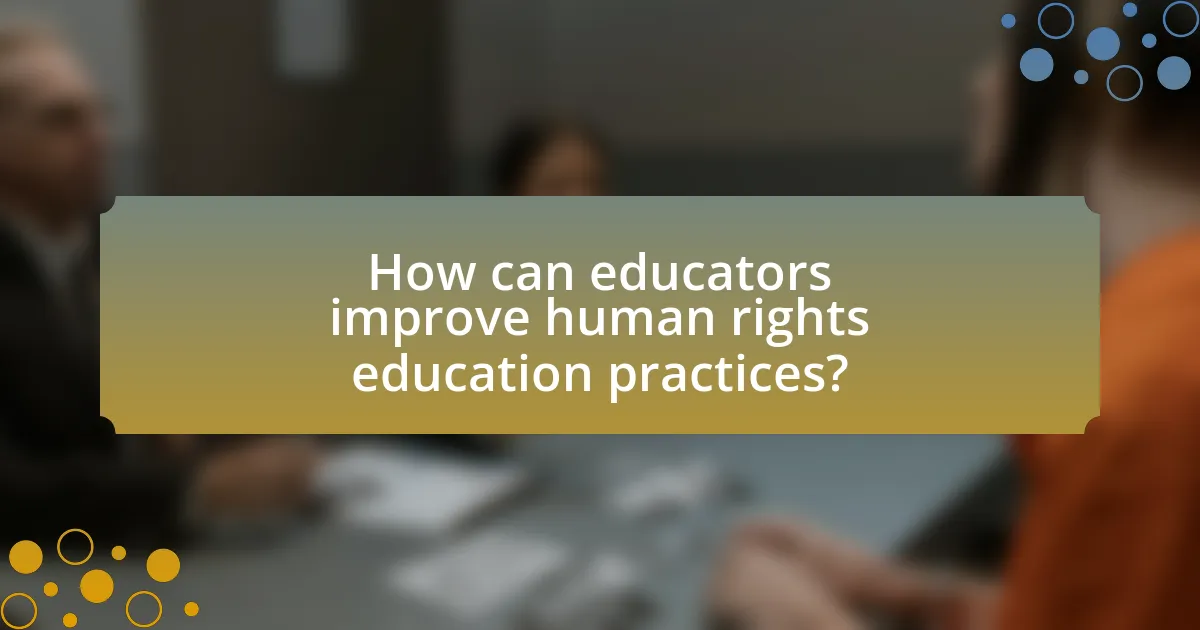
How can educators improve human rights education practices?
Educators can improve human rights education practices by integrating experiential learning methods that engage students in real-world human rights issues. Research indicates that active participation in discussions, simulations, and community projects enhances students’ understanding and commitment to human rights (UNESCO, 2014). By incorporating case studies and current events into the curriculum, educators can provide context and relevance, fostering critical thinking and empathy among students. Additionally, professional development for educators focused on human rights pedagogy can equip them with the necessary tools and strategies to effectively teach these concepts.
What resources are available for teaching human rights?
Various resources are available for teaching human rights, including educational curricula, online platforms, and multimedia materials. Organizations such as Amnesty International and Human Rights Watch provide comprehensive teaching resources, including lesson plans, case studies, and interactive activities designed to engage students in human rights issues. Additionally, the United Nations offers the “Human Rights Education Training Manual,” which serves as a guide for educators to incorporate human rights education into their teaching practices. These resources are validated by their widespread use in educational institutions globally, promoting awareness and understanding of human rights among students.
How can educators access training on human rights education?
Educators can access training on human rights education through various organizations and online platforms that specialize in human rights advocacy and education. For instance, the United Nations offers resources and training programs specifically designed for educators, which can be found on their official website. Additionally, organizations like Amnesty International and Human Rights Watch provide workshops, webinars, and educational materials aimed at enhancing educators’ understanding of human rights issues. These resources are often backed by research and best practices in the field, ensuring that educators receive accurate and relevant training.
What organizations support human rights education initiatives?
Organizations that support human rights education initiatives include Amnesty International, Human Rights Watch, and the United Nations Educational, Scientific and Cultural Organization (UNESCO). Amnesty International promotes human rights education through campaigns and resources aimed at raising awareness and fostering understanding of human rights issues globally. Human Rights Watch conducts research and advocacy to highlight the importance of education in promoting human rights, while UNESCO develops educational programs and materials that emphasize human rights principles and values in various educational settings. These organizations collectively contribute to enhancing human rights awareness through structured educational initiatives.
What best practices should educators follow in promoting human rights awareness?
Educators should incorporate interactive teaching methods, such as discussions and role-playing, to effectively promote human rights awareness. These methods engage students actively, fostering critical thinking and empathy towards human rights issues. Research indicates that experiential learning significantly enhances students’ understanding and retention of complex topics, including human rights (Kolb, 1984). Additionally, integrating diverse perspectives through literature, case studies, and guest speakers can broaden students’ understanding of global human rights challenges. This approach aligns with findings from the United Nations Educational, Scientific and Cultural Organization (UNESCO), which emphasizes the importance of inclusive education in fostering respect for human rights.
How can educators assess the effectiveness of their human rights education efforts?
Educators can assess the effectiveness of their human rights education efforts by utilizing pre- and post-assessments to measure changes in students’ knowledge, attitudes, and behaviors regarding human rights. These assessments can include surveys, quizzes, and reflective essays that evaluate students’ understanding of human rights concepts before and after the educational intervention. Research indicates that structured assessments can reveal significant improvements in students’ awareness and engagement with human rights issues, as demonstrated in studies such as “The Impact of Human Rights Education on Students’ Attitudes” published in the Journal of Human Rights Education, which found that 75% of participants showed increased knowledge and empathy towards human rights topics after targeted education.
What strategies can be implemented to sustain human rights awareness in education?
To sustain human rights awareness in education, integrating human rights education into the curriculum is essential. This can be achieved by developing comprehensive lesson plans that include topics such as the Universal Declaration of Human Rights, case studies of human rights violations, and discussions on current events related to human rights. Research indicates that when students engage with real-world issues, such as those highlighted in the 2019 report by the United Nations Educational, Scientific and Cultural Organization (UNESCO), they demonstrate a greater understanding and commitment to human rights principles. Additionally, training educators to effectively teach human rights topics ensures that the information is conveyed accurately and engagingly, fostering a culture of awareness and advocacy among students.
